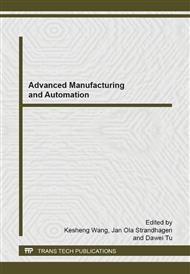[1]
Feng Liu, Jian-Jun Wang and De-Li Yang: Solving single machine scheduling under disruption with discounted costs by quantum-inspired hybrid heuristics. Journal of Manufacturing Systems. 32(2013) 716-732.
DOI: 10.1016/j.jmsy.2013.04.002
Google Scholar
[2]
Bing Wang, Xiaoping Lai and Lifeng Xi: Single-Machine Partial Rescheduling with Bi-criterion Based on Genetic Algorithm. Advances in Intelligent Computing. 3644(2005) 947-956.
DOI: 10.1007/11538059_98
Google Scholar
[3]
Bing Wang, Xiaoying Hong: Rolling Partial Rescheduling Driven by Disruptions on Single-machine Based on Genetic Algorithm. IEEE Symposium on Computational Intelligence in Scheduling. (2007) 72-78.
DOI: 10.1109/scis.2007.367672
Google Scholar
[4]
Hoogeveen H., Lente C., Tkindt V.: Rescheduling for new orders on a single machine with setup times. European Journal of Operational Research. 223(2012) 40-46.
DOI: 10.1016/j.ejor.2012.05.046
Google Scholar
[5]
Nicholas G. Hall, Chris N. Potts.: Rescheduling for job unavailability. Operations research. 58(2010) 746-755.
DOI: 10.1287/opre.1090.0751
Google Scholar
[6]
Aytug H., Lawley MA, McKay K., Mohan S., Uzsoy R: Executing production schedules in the face of uncertainties: a review and some future directions. European Journal of Operational Research. 161(2005) 86–110.
DOI: 10.1016/j.ejor.2003.08.027
Google Scholar
[7]
Ouelhadj D, Petrovic S.: A survey of dynamic scheduling in manufacturing systems. Journal of Scheduling. 12(2009) 417–31.
DOI: 10.1007/s10951-008-0090-8
Google Scholar
[8]
Patrick Moratori, Sanja Petrovic and Jose Antonio Vazquez-Rodriguez.: Match-up approaches to a dynamic rescheduling problem. International Journal of Production Research. 50(2012) 261-276.
DOI: 10.1080/00207543.2011.571458
Google Scholar
[9]
Qi X, Bard JF, Yu G.: Disruption management for machine scheduling: the case of SPT schedules. International Journal of Production Economics. 103(2006) 166–84.
DOI: 10.1016/j.ijpe.2005.05.021
Google Scholar
[10]
Sabuncuoglu, M. Bayiz.: Analysis of reactive scheduling problems in a job shop environment. European Journal of Operational Research. 126(2000) 567-586.
DOI: 10.1016/s0377-2217(99)00311-2
Google Scholar
[11]
Wu, S.D., Storer, R.H., Chang, P.C.: One-machine Rescheduling Heuristics with Efficiency and Stability as Criteria. Computers & Operations Research. 20(1993) 1–14.
DOI: 10.1016/0305-0548(93)90091-v
Google Scholar
[12]
M. R. Garey and D. S. Johnson.: Computers Intractability. Freeman, San Francisico, Calif, (1979).
Google Scholar
[13]
J. C. Bean, J. R. Birge.: Match-up real-time scheduling. In Proceeding of the Symposium on Real Time Optimization in Automated Manufacturing Facilities / pp.197-212 NBS publication 724, National Bureau of Standards (1985).
Google Scholar
[14]
J. C. Bean, J. R. Birge, J. Mittenehal, C. E. Noon.: Match-up scheduling with multiple resources, release dates and disruption. Operations Research. Operations research. 39(1991) 470-483.
DOI: 10.1287/opre.39.3.470
Google Scholar
[15]
Chris N. Potts, Luk N. Van Wasscnhove: A branch and bound algorithm for the total weighted tardiness problem . Operations Research. 33(1985) 363-377.
DOI: 10.1287/opre.33.2.363
Google Scholar
[16]
Jacques Carlier.: The one-machine sequencing problem. European Journal of Operational Research. 11(1982) 42-47.
DOI: 10.1016/s0377-2217(82)80007-6
Google Scholar
[17]
I. M. Ovacik, R. Uzsoy.: Rolling horizon algorithms for a single-machine dynamic scheduling problem with sequence-dependent setup times. International Journal of Production Research. 32(1994) 1243-1263.
DOI: 10.1080/00207549408956998
Google Scholar


